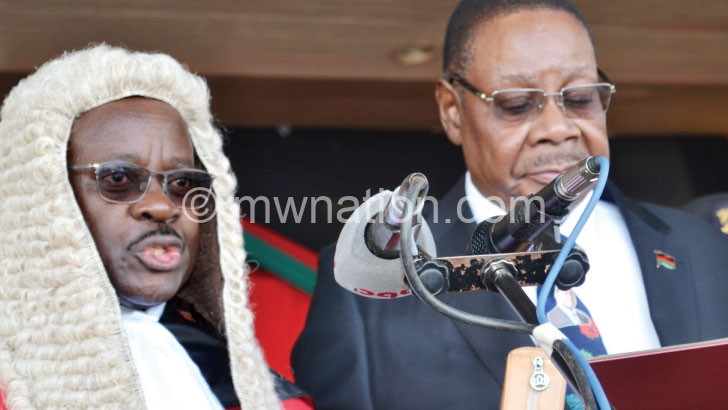Malawi’s democracy faces stern test
He was declared winner of the May 21 2019 presidential vote, but the Constitutional Court (ConCourt), following application by two opposition candidates, nullified the election on February 3 and ordered a fresh poll within 150 days.
President Peter Mutharika, who was the first respondent, called the ConCourt decision a travesty of justice with his Democratic Progressive Party (DPP) and its supporters going as far as questioning the integrity of the judges behind the court ruling.
Still believing that he won “fair and square”, the President went to the Malawi Supreme Court of Appeal where, again, he lost the case.
A disappointed Mutharika then called the final court decision that his re-election remained nullified a “judicial coup d’état and totally ridiculous”.
Parliament has now set June 23 as date for the fresh presidential election, forcing an already infuriated Mutharika to defend his crown for the second time in 13 months.

The rising temperature from the conflict between the administration and the Judiciary jumped several degrees last week when Chief Secretary to the Government Lloyd Muhura issued a public notice to the effect that Chief Justice Andrew Nyirenda should proceed on leave pending retirement.
Critics interpreted such an announcement as the Executive’s effort to shove off the man at the helm of an institution that snatched Mutharika’s second term as President by boxing him into forced leave pending retirement in December 2021 when he reaches the mandatory age of 65.
But while Nyirenda has not publicly commented on the matter, the Judiciary has pushed back hard at the Executive, saying Capital Hill has no business interfering in the administrative business of who goes on leave and when at the Judiciary.
The Chief Justice, said registrar of the High Court and Malawi Supreme Court of Appeal Agnes Patemba—is not going anywhere before the expiry of his term.
The administration’s move to topple the Chief Justice has sparked local and international condemnation, with reputable individuals and institutions in the legal and civil society platforms telling the Executive to stop threatening judicial independence.
There are now planned protests by some members of the legal fraternity against what critics have said is an uncalled for aggressive encroachments on the Judiciary’s turf.
But now the feud, say legal and political experts, risks plunging Malawi into a governance bind that could harmstring Malawi’s democratic system—including constitutionalism and rule of law—for years.
In an interview yesterday, Danwood Chirwa, a professor of law at the University of Cape Town in South Africa, said an attack on the Judiciary always creates constitutional and political crises.
He argued that the current feud is beyond the Executive and the Judiciary as it is between the Executive arm of government and the legal profession, civil society, international organisations and legal scholars who are fighting against assault on the Judiciary.
Said Chirwa: “The aim of the assault is to capture the Judiciary by removing those believed to be too independent and replacing them with those believed to be controllable and pro-Executive. By demolishing the Judiciary, you break down a system of checks and balances.
“Parliament, when there is a government with the requisite electoral legitimacy, can be dominated by government parliamentarians. This isn’t the case now, but ordinarily it should be. This is why the Judiciary is the main check on abuse of power. Without it, you have repression, and no protection of individual rights or constitutionalism.”
Human rights law specialist Chrispine Sibande said the perceived constitutional pandemonium could be interpreted to be a deliberate move to create political disorder, but feared Malawians will be losers if it persists.
He said the Judiciary should not succumb to those who feel they are powerful and can bend rules as part of exercising their mind, creating fictitious authority rather than that which is created in the law.
Warned Sibande: “Malawians will be the ultimate losers if such fights continue because there will be constitutional disorder and disorder builds anarchy and anarchy threatens the very foundation of the nation.
“The integrity of the Judiciary is based on its ability to stand firm in being independent and impartial, on its ability to correctly interpret and apply laws of Malawi without external influence or irrelevant considerations.”
In a separate interview, socio-political commentator Humphrey Mvula said the feud could affect peace in the country.
“The most difficult scenario shall be when the DPP-UDF triumphs because they will now have held on to power, which is regionally structured, which will be the South versus Central and Northern regions.
“That will continue to create instability. But if the opposition wins, they may try to bring the country together. There is need to create some deliberate healing process, some mediation. Unfortunately, most of the individuals are compromised.”
Political Science Association secretary general Ernest Thindwa said the country may be bruised depending on the logical conclusion of the matter, which he thinks, is only going to be done through the June 23 vote.
But Thindwa said Malawi has come of age as it is showing that the country now has a critical mass—a group of people who make a drastic change, altering their behaviour, opinions or actions.
Based on the constitutional set-up which is mirrored on checks and balances, political scientist Joseph Chunga said squabbles among the three arms of government—the Legislature, the Executive and the Judiciary—are expected, but said the situation now is different because the Executive wants to be an errant arm.
But presidential press secretary Mgeme Kalilani said in any governance process, there is bound to be unnecessary impasses when one of the arms of government starts to behave like it is superior to the others.
He said the ultimate custodians of powers exercised by the Judiciary, the Executive and Parliament are the citizens.
Meanwhile, Public Affairs Committee (PAC) spokesperson Bishop Gilford Matonga said the quasi-religious group will meet today to see how best to approach concerned parties.





